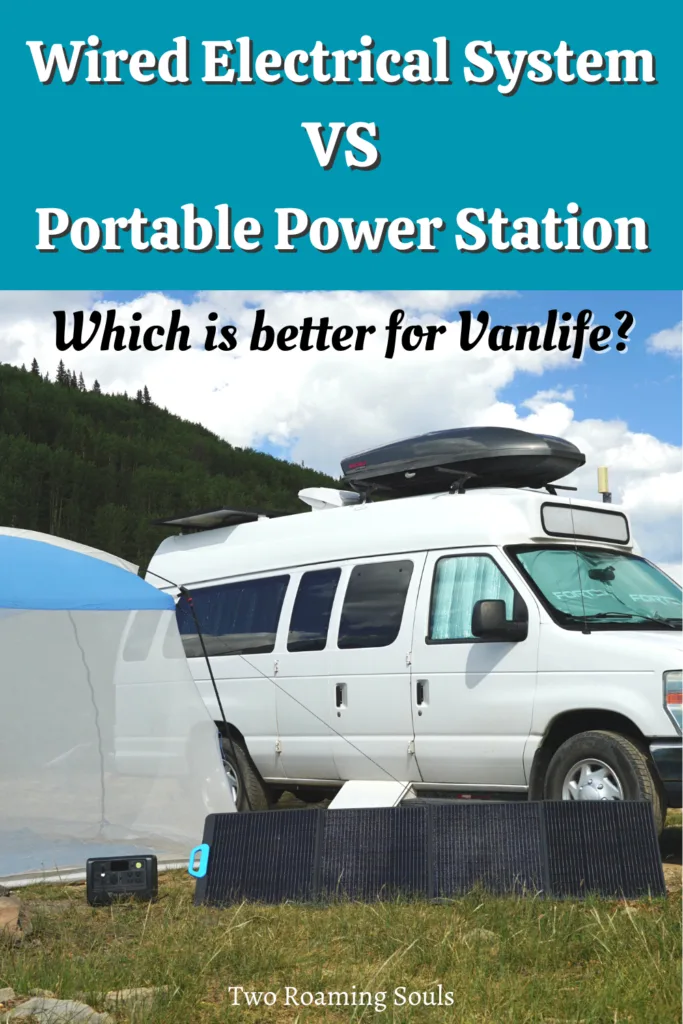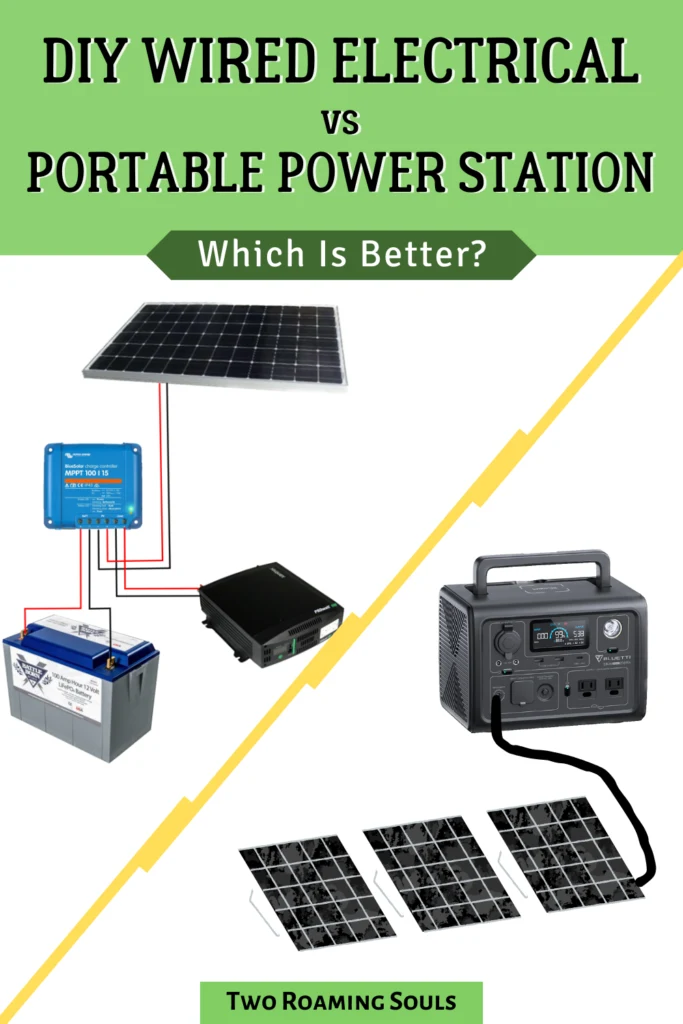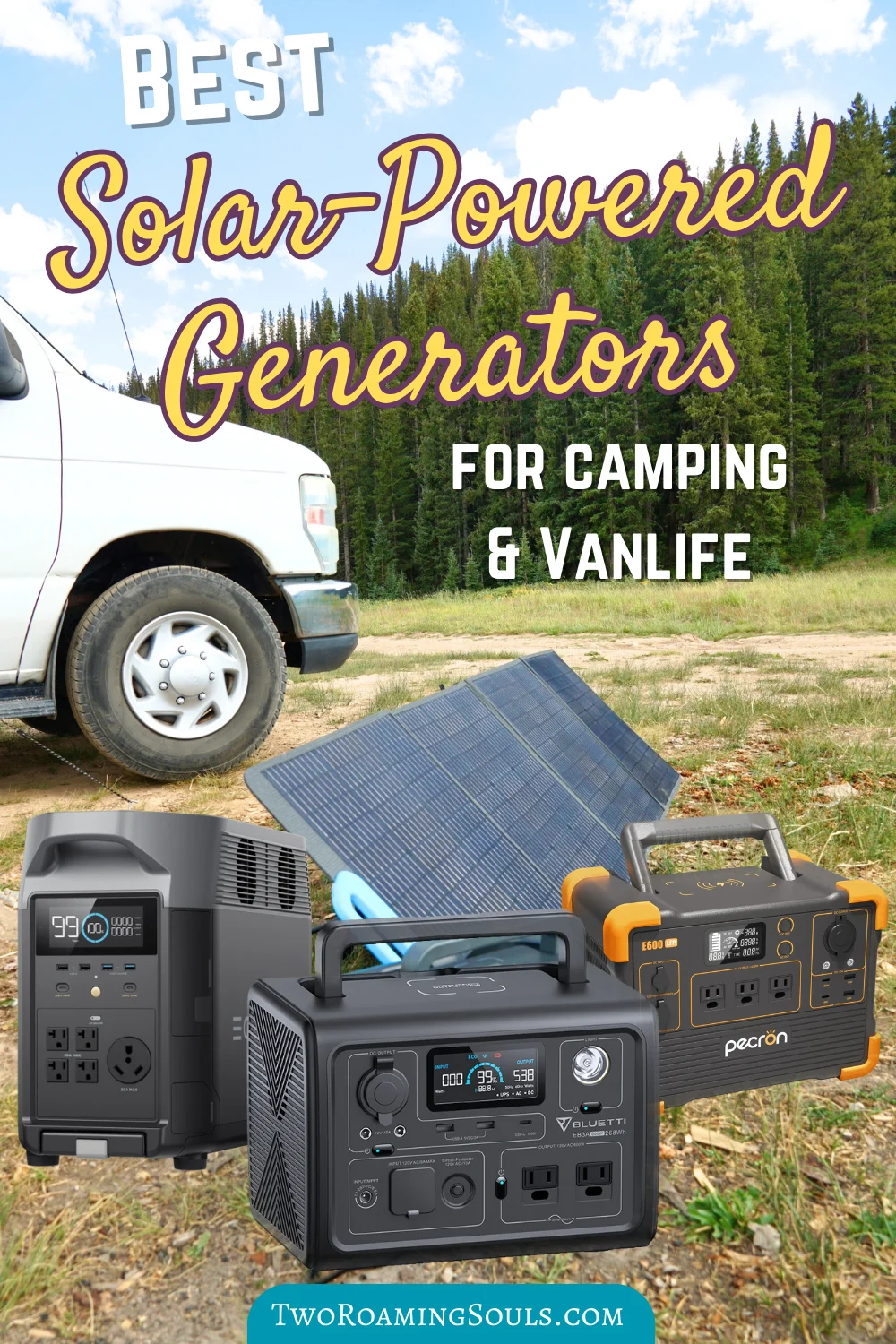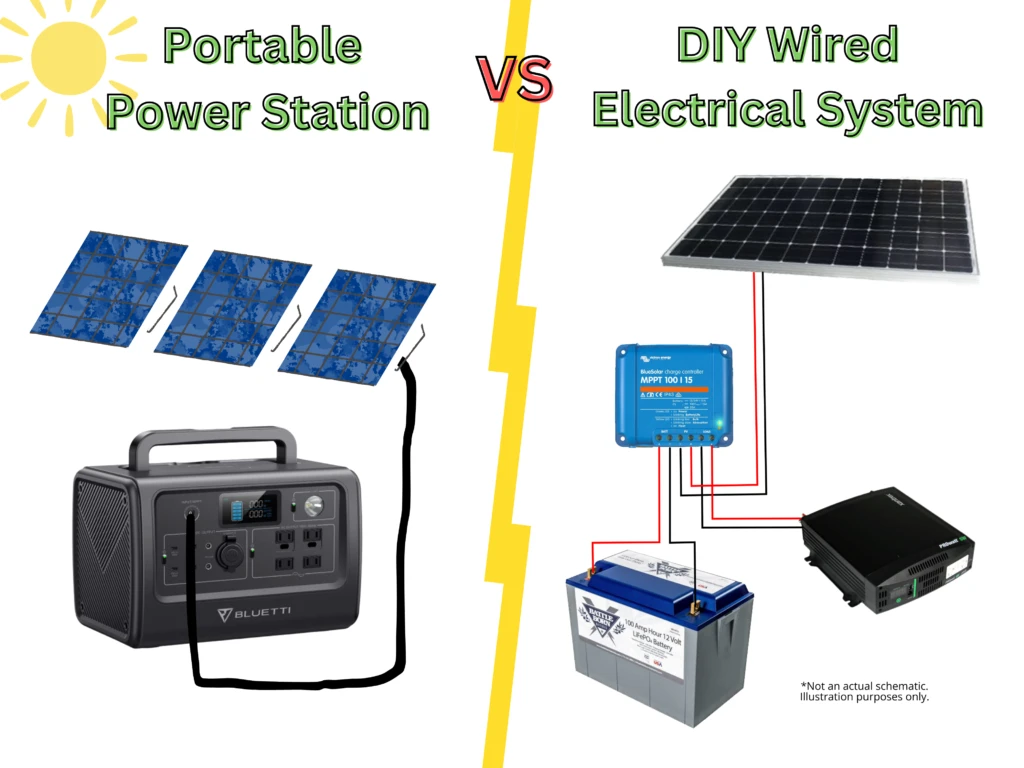
When converting a campervan, you can decide between two types of off-grid power systems. A portable power station is an all-in-one electrical source, whereas a wired electrical system is made up of individual components wired together. This post can help you decide between a portable power station versus wired electrical system.
Both systems can serve as an off-grid power source for powering things like a fridge, roof vent fan, lights, TVs, as well as charging everyday devices like smartphones, laptops, cameras, drones, etc.
And both power systems can be charged in a variety of ways, like solar, grid power, and vehicle charging.
But what are the key differences that set them apart?
Which system is right for you?
Let’s get into the details.
This post may contain affiliate links. Disclosure policy.
What Is A Wired Electrical System?
A wired electrical system consists of a variety of electrical components wired together to offer storage and access to electricity. This is the more traditional choice for electricity in a campervan.
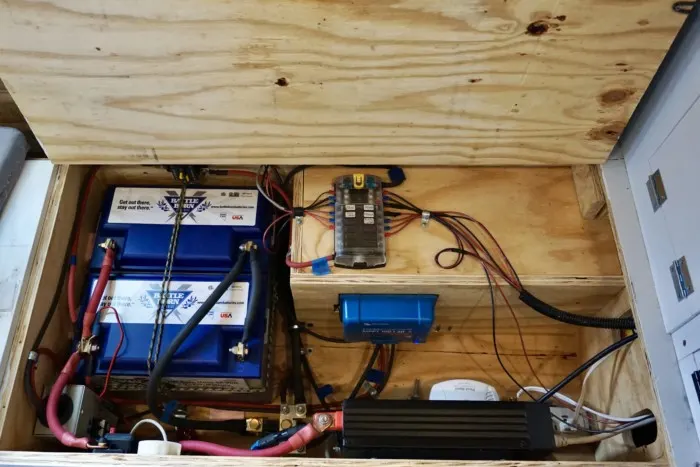
Since wired systems are very customizable, they come in many configurations. But a common basic starting point includes batteries, a solar charge controller, a fuse box, an AC inverter, solar panels and/or DC-DC charger.
This allows you to use electricity stored in batteries, and also provides an off-grid way to recharge those batteries.
Pros and Cons of Wired Electrical Systems
| Pros | Cons |
| Infinitely customizable | More complex to install |
| Power outlets integrated into campervan design | Time consuming to install |
| Better for full-time everyday use | Not portable |
| Cheaper to upgrade storage | Higher chance of user error |
| DIY repairs and troubleshooting | Tools required |
The main benefits of a wired electrical system are integration, customization, and better suitability for large systems.
Let me elaborate on those benefits.
Integration
A DIY wired electrical system can be seamlessly integrated into your campervan build.
This includes concealed wiring and controls for lights, switches, and appliances. Integrated wiring makes your campervan feel more like a traditional home.
And for appliances that you plan to have powered 24/7 (like a fridge), a wired electrical system is much better.
The smaller components of a wired system can be mounted into tighter spaces (often a consideration for campervan conversions).
Customization
A wired electrical system is infinitely customizable. You can design an electrical system that perfectly fits your needs. With a traditional fuse box, you can connect so many more simultaneous loads. For a campervan with many power needs, the wired system is better equipped to handle it. For example you might have a fridge, roof vent fan, water pump, lights, cell-signal booster, TV, etc).
But maybe more importantly, you can upgrade or adjust a DIY wired system over time. You can begin with components that fit your budget, and then upgrade later when your budget allows.
Or if a single component breaks, you can just replace that single component.
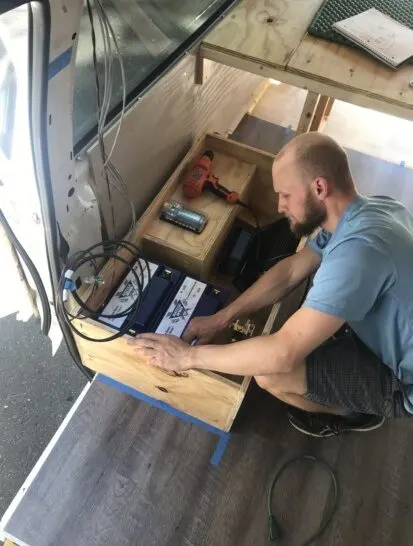
The negatives of a wired electrical system are the difficulty and time of installation, non-portability, and a higher chance of user error.
Installing a wired electrical power system is not especially easy for your average DIYer. And unlike other parts of a van conversion, electrical leaves little room for error or poor workmanship.
The consequences of a poorly done electrical system can be catastrophic, leading to vehicle fire or damage to expensive components.
So really, the stakes are very high when wiring an electrical system yourself. It’s the part of the van conversion I most encourage people to hire out to professionals. If you pay to have someone else install your wired electrical system, you get all the benefits without necessarily having to learn how.
However, I do believe that most people can learn the skills to wire their own electrical system. But it does take deliberate effort and attention to detail to ensure it’s done properly.
I’ve written two blog posts that help teach beginners the basics.
- (Part 1) Beginner Guide to Solar Components
- (Part 2) Wiring, Fuses, Tools, Techniques, Etc.
If you feel that you have a good grasp of the concepts covered in these posts, then you may have the confidence to proceed with a DIY electrical setup.
Another negative is that a wired electrical system is not portable. This isn’t necessarily a big problem, since everywhere your van goes, so does your power system. But you likely will not bring your power system with you if you buy a new vehicle.
What Is A Portable Power Station?
A Portable Power Station is a beginner-friendly plug-and-play system for off-grid power. They are also called solar generators, power banks, solar battery stations, etc (I may use these terms interchangeably).
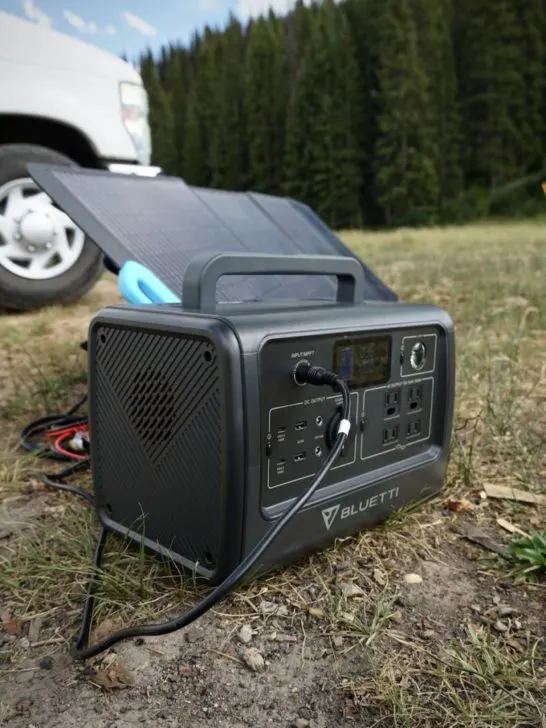
Portable power stations usually contain all the components of a wired electrical system, but all in one neat package. The top-of-the-line power stations include a bank of battery cells, battery monitoring system (BMS), pure sine wave AC inverter, solar charge controller, DC ports, AC outlets, and more.
Portable power stations are commonly paired with folding solar panels. So users typically set up the panels outside on the ground, oriented towards the sun. But they also usually include cables to charge via an AC outlet or (very slowly) from a vehicle cigarette lighter port.
Pros and Cons of Portable Power Stations
| Pros | Cons |
| Portable | Bad for integrated and concealed wiring |
| Beginner Friendly | Limited expandability |
| No Installation Required | Expensive (or impossible) to add battery capacity |
| Often great Sale prices | Portable solar panels are expensive |
The primary benefits of portable power stations are portability and simplicity.
Let’s elaborate on those benefits.
Portability
The portability of solar-powered generators gives you several unique options that may appeal to some people.
You can carry your power station somewhere to charge it. For example, you can charge it at work, a friend’s house, etc. However, some people may not appreciate you basically stealing electricity, especially if it’s a regular occurrence. So navigate that situation with grace or offer financial compensation.
If you buy a new van, you can easily transfer your power station to your new vehicle.
Or with portable solar panels, you can put your panels in the sun, and leave your van parked in the shade. (Technically, you can also do this with a wired electrical system if you have portable solar panels, but it’s less common.)
Simplicity
The other primary benefit of portable power stations is their plug-and-play usability. For beginners, they offer a convenient off-grid power solution that anyone can use.
Within seconds of unboxing your portable power station, you have usable off-grid power. If time is of the essence, there is no faster way to get on the road with a working electricity source than a portable solar generator.
Many aspiring vanlifers are very intimidated by electricity. Learning the basics about Watts, Amps, and Volts can be an anxiety-inducing process. But portable power stations can (somewhat) spare people from learning about electricity.
You are basically paying a premium for the convenience of a plug-and-play system. That convenience and time savings may be worth it for some people.
Negatives of Portable Power Stations
However, insulating yourself from learning about electricity has some negative consequences.
For starters, sometimes people don’t make an educated purchase. They are too lazy to actually determine what their power needs are, and end up buying a power station that’s insufficient for their needs.
And second, people don’t bother to learn how much power different devices consume (this calculator is an easy place to start). This results in careless and uninformed use of power.
Living with a limited supply of power rewards those who conserve and use power wisely. And people who have built their own DIY electrical system tend to have a much better understanding of their system.
Owning a ‘name brand’ portable power station is kind of like owning Apple products. Sure, they are good products, but they have you trapped in their product ecosystem.
For anything you need (customer service, troubleshooting, repairs, accessories, etc.), you are basically stuck dealing with that one company.
Additionally, portable solar generators allow for very little customization or expandability. The most common expandability option is that some companies sell expansion batteries.

These additional batteries piggyback on their power stations to provide more battery capacity. But the price per Watt-hour (capacity) is much more expensive than upgrading the capacity of a DIY wired electrical system.
And expansion batteries are often only available for the much large ‘home backup’ type power stations. So for many brands that basically eliminates the possibility of “starting small” and then adding battery capacity later.
There are some other solar generator accessories available, like charging cables and adapters, but otherwise, what you purchase is what you have for the life of the product.
Portable Solar-Powered Generators are also one giant unit. The larger you buy, the harder it is to find a place to fit it into your van.
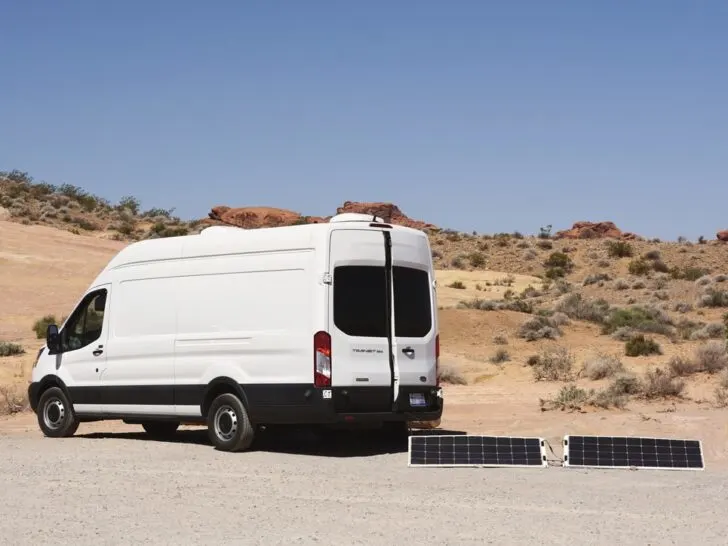
Some portable power stations can also be charged with third-party rigid solar panels. (You just need to be sure that you have the right cables and connectors to pair them).
Rigid solar panels are better for everyday use because of their durability and permanent installation. But venturing into third-party solar panels is not as common for portable power stations because it begins to take away from the user-friendliness.
Myths About Portable Power Stations vs Wired Electrical Systems
Doing research for this post challenged some of my previously held beliefs about portable power stations.
Portable Power Stations are much more expensive (per Wh) than a DIY system?
FALSE
While this may have been true in the past, it’s really not true anymore. Portable Power Stations have become on par with or even cheaper than a DIY electrical system.
And portable solar generators can commonly be purchased on sale, sometimes up to 40% off. You would have to be extremely lucky to get all parts of a wired electrical system at that big of a discount.
However, there are three aspects where portable power stations are usually more expensive: portable solar panels, large systems, and expansion batteries.
Portable folding solar panels are definitely more expensive (per Watt) than rigid glass solar panels.
Portable Power Stations cannot be charged with third-party solar panels?
FALSE
Most brands won’t exactly advertise that you can use third-party solar panels (because they want you to spend more money on theirs).
But you usually can use third-party solar panels. This is preferable to many campervan owners because roof-mounted rigid solar panels are best for full-time use.
You just need to ensure that your solar panels are within the acceptable solar input range. Some brands do have proprietary connections (like Goal Zero and Jackery), but even for those brands you can buy adapters.
Price Comparison: Wired Electrical vs Portable Power Station
Price is obviously an important consideration for most people preparing for Vanlife.
Here is a basic price comparison between top selling portable power stations and a similar wired electrical system.
To control for variables, I chose to compare systems with these specs:
- ≈1200Wh Battery Capacity
- Lithium Iron Phosphate (LiFePo4)
- Pure Sine Wave Inverter
- MPPT Charge Controller
Solar panels have been left out of this comparison. Because as we discussed before, you can use either rigid or portable solar panels with either system.
But remember that portable folding solar panels (usually paired with power stations) are quite a bit more expensive than rigid glass solar panels.
Budget 1200Wh LiFePo4 System
- Battery: LiTime LiFePo4 12v 100Ah (1200Wh) = $329
- Charge Controller: Renogy Rover MPPT 20A = $109
- Battery Monitor: Aili Battery Monitor & Shunt = $41
- Fuse Box: Blue Sea Systems 12V Fuse Box = $57
- AC Inverter: Xantrex 1000W Pure Sine Wave = $399
- Additional Parts (wiring, fuses, tools, etc.) = $300-$500
- TOTAL PRICE = $1,235 – $1,435
Expensive 1200Wh LiFePo4 System
- Battery: Battle Born LiFePo4 12v 100Ah (1200Wh) = $925
- Charge Controller: Victron MPPT 100 | 15A $145
- Battery Monitor: Victron BMV-712 Battery Monitor $195
- Fuse Box: Blue Sea Systems 12V Fuse Box = $57
- AC Inverter: Xantrex 1000W Pure Sine Wave = $399
- Additional Parts (wiring, fuses, tools, etc.) = $300-$800
- TOTAL PRICE = $2,021 – $2,521
Top 1200Wh LiFePo4 Portable Power Stations
- Bluetti AC180 (1,152Wh) = $999
- EcoFlow Delta (1,260Wh) = $1,399
- Jackery Explorer 1000 Plus (1,264Wh) = $1,699
As of writing this (October 2023), both the Bluetti and Ecoflow are on sale for around $700, which is an excellent deal.
So when comparing the price between portable power stations and a wired electrical system, they are pretty close. And obviously there are many factors that can impact the cost. Such as, brand, individual components, battery capacity, etc.
Remember that portable solar panels are more pricey than rigid solar panels.
See all of our top recommended portable power stations.
Conclusion: Portable Power Station Vs Wired Electrical System
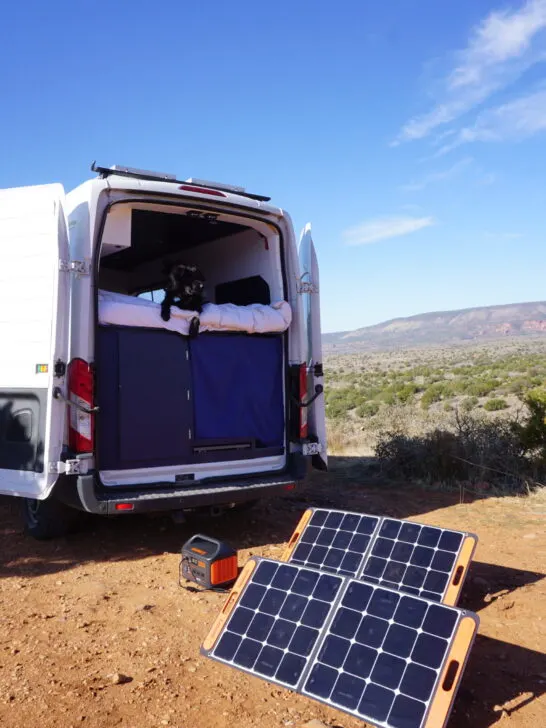
Deciding between Portable Power Station vs Wired Electrical System for your campervan is not a simple decision. But there’s a variety of factors that may help you decide.
Who Should Choose A Portable Power Station?
Obviously, solar generators are uniquely portable. So if you want to use the system outside your van, on other camping trips, tailgating, etc, then a portable solar generator is ideal. Or if you might change vehicles in the near future, you can easily transfer the power station to your new vehicle.
Portable power stations also save you time. If you are in a hurry to get on the road quickly, there’s no faster way to have reliable off grid power than buying a portable solar generator.
Portable power stations are better for people with more minimal power needs. They work well for people who just need to charge a phone, laptop, lights, and maybe a few other small loads.
They also are a good fit for people who lack the expertise or willingness to learn the ins and outs of electricity. Also you don’t need to buy any tools.
In our opinion, the best brands of portable power stations are Ecoflow, Bluetti, and Anker. If you are looking for a more budget-friendly brand, we recommend Pecron and Vtoman.
Who Should Choose DIY Wired Electrical System?
A wired electrical system is best for having electrical wiring integrated into your van build. With an endless possibility of outlets, switches, and connections, your electrical system can feel more like a traditional home.
A wired electrical system is best for advanced level DIYers with good attention to detail. If you install your own electrical system, it’s imperative that you do it correctly. One bad connection or missing fuse could cause a devastating electrical fire.
A wired electrical system is best for very large systems (2kWh plus). For constant heavy loads like air-conditioning, induction cooking, etc you are better off with a wired electrical system.
A wired system is better for people starting with a small budget and planning to upgrade over time.
Related Posts by Two Roaming Souls
These are our top picks for Portable Power Stations. We narrowed it down to the best options one the market for each tier of battery capacity.
Visit our Vanlife Solar Shop, with all our recommended solar power components.
Or you can always visit our Vanlife Page, with all things related to campervans and living on the road.
If you are on the fence about doing your own wired electrical system, here is my simple beginners Guide to A Solar Wired Electrical System. It teaches you the basics in an easy to understand format.
And next this Wiring Guide has everything you need to know about wiring, connectors, crimping, etc.
If your campervan has a fiberglass roof, like ours, we detailed how we attached a large solar panel to our fiberglass hightop van. And then we created a cheap DIY solar panel tilting mount to collect even more solar power.
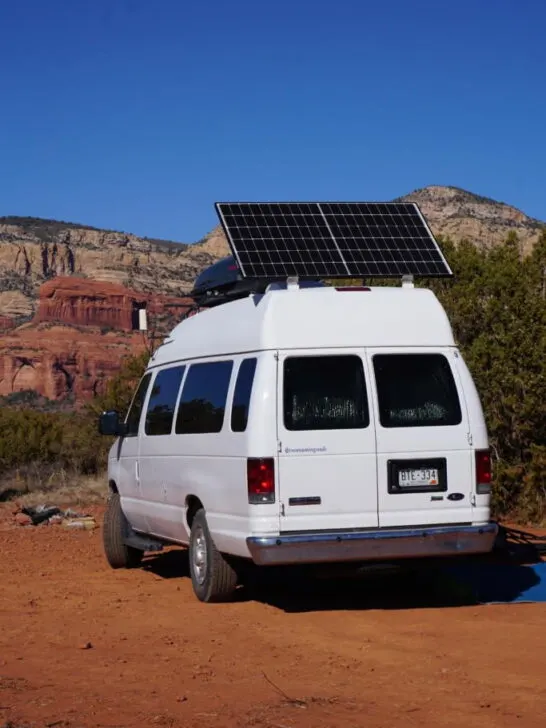
Share ‘Portable Power Stations Vs Wired Electrical System’ on Pinterest!
